Training and Employment
The Sustainable Energy and Economic Development (SEED) Project provided comprehensive training programs in energy efficiency and renewable energy, targeting a wide range of participants and covering various levels—from public awareness to accredited professional certifications.
These programs were carefully designed to link training with real job opportunities, helping over 1,100 participants enhance their skills. Among them, 700 secured employment, 500 received practical training, and 315 obtained long-term stable jobs.
This effort empowered young men and women to launch their careers in the sustainable energy sector and created inspiring success stories at the community level.

Empowering Local Talent through Renewable Energy Training
Through 47 specialized training courses, the project trained more than 1,100 participants—men and women—in energy efficiency, renewable energy, leadership, and entrepreneurship. The programs catered to diverse groups, from housewives to engineering graduates, with a clear focus on enabling young women to take on leadership roles in their communities.
Training was delivered through community centers and practical labs, effectively linking education to hands-on experience and paving the way for a new generation of leaders in the sustainable energy sector.
Challenging Stereotypes and Opening Doors for Women in the Energy Sector
At the start of the project, the teams faced challenges related to the acceptance of women working in energy system installation. However, the female trainees demonstrated strong competence, changing perceptions on the ground. One contractor noted: “I never expected this level of commitment and speed — the women were faster and more disciplined than the men.”
The transformation began with raising awareness among youth andprofessionals about the opportunities within sustainable energy, attracting them to promising career paths. Today, the success stories from Ajloun and Deir Alla stand as living proof of how training can drive meaningful change in local communities.


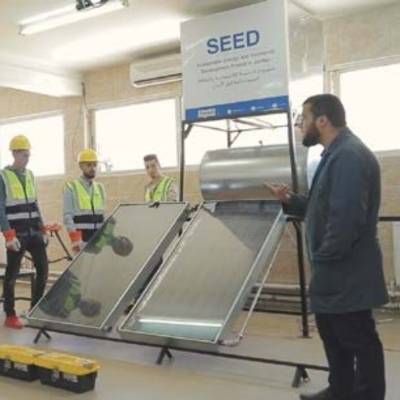
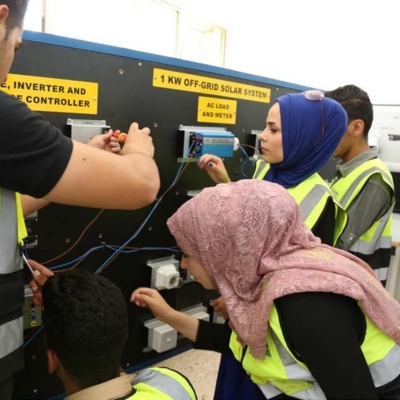
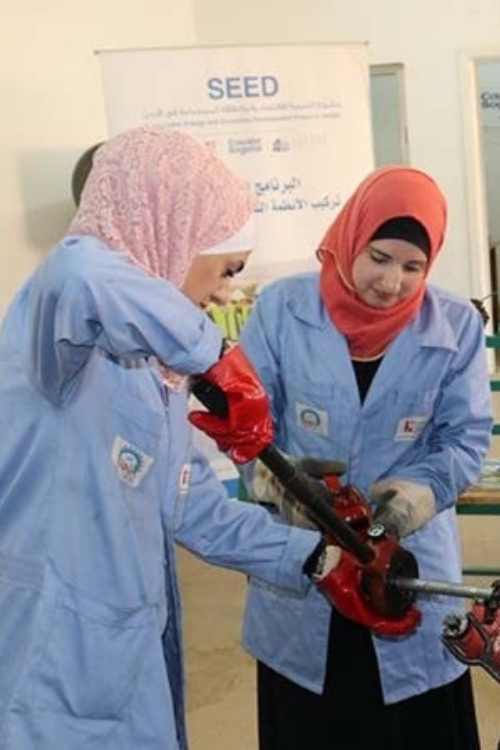
Establishing Vocational Labs to Build Sustainable Energy Skills
The labs also strengthen trainers’ capacities and provide a practical learning environment, contributing to the development of a skilled workforce capable of advancing national sustainability goals.

Handbooks as Key References for Energy Efficiency and Renewable Energy
The project produced three handbooks serving as key references in solar photovoltaic system installation, solar water heater installation, and energy efficiency and conservation. The Energy Efficiency Guide is the first of its kind in Arabic in Jordan, making it a foundational resource for technical knowledge in this vital sector.
These handbooks are comprehensive and practical, thoughtfully designed to incorporate environmental and social considerations—including gender equality, environmental sustainability, and climate change awareness. They are also used as core materials in the project’s sustainable energy training programs.
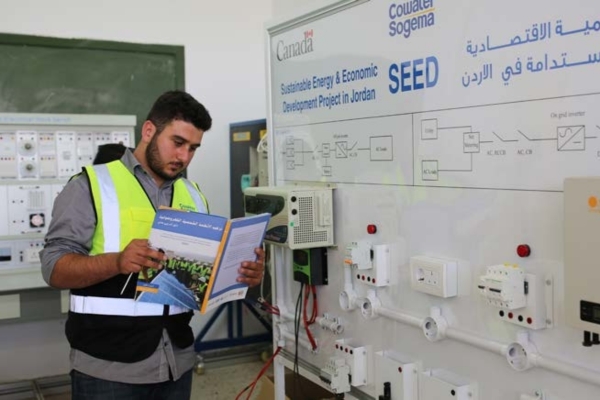


When Challenges Become Opportunities: SEED’s E-Learning Experience
The Sustainable Energy and Economic Development (SEED) Project adopted an innovative approach by shifting to e-learning in response to the challenges brought on by the COVID-19 pandemic between 2020 and 2022. With in-person training sessions no longer feasible, the project developed and delivered a variety of digital courses and interactive online webinars, enabling it to expand its reach beyond Deir Alla and Ajloun.
As a result, the project successfully engaged thousands of participants from both inside and outside Jordan. This digital learning experience proved effective in disseminating knowledge and raising awareness of best practices in energy efficiency and renewable energy (EE&RE). It marked a significant shift in the continuity of education and underscored the project’s ability to adapt to challenges while providing impactful and sustainable solutions in the energy sector.
From Training to Employment: Connecting Local Talent with Sustainable Energy Jobs
SEED worked to empower local community members to enter the energy efficiency and renewable energy sectors with confidence and readiness, offering flexible and inclusive training paths. The programs were tailored to serve all skill levels, enabling participants to pursue specializations that matched their interests and career goals—whether in energy auditing, solar PV system installation, solar water heater installation, or business and communication skills.
To enhance the real-world impact of this training, the project’s Job Linkages Unit played a pivotal role in facilitating the transition from training to employment. This was achieved through job interviews, career fairs, and collaboration with local partners. Additionally, the project launched a successful internship program, providing over 500 practical training opportunities within private sector companies across Jordan, helping trainees gain valuable field experience.
This integrated model of training and professional development reflects SEED’s commitment to turning education into tangible opportunities and building a national workforce capable of leading the transition to a more efficient and sustainable energy future.





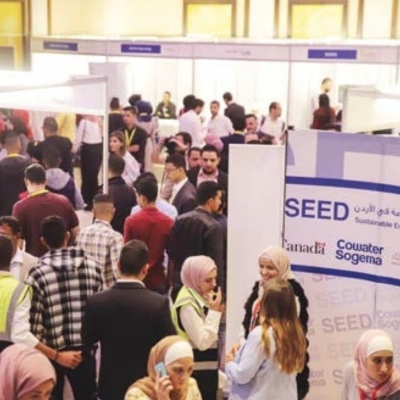

Sustainable Employment Solutions to Support the Growth of Jordan’s Energy Sector
The project has contributed to expanding employment opportunities in the energy efficiency and renewable energy sectors by supporting skilled labor, small enterprises, and entrepreneurs. A strong emphasis was placed on empowering women by training them in solar energy system installation—enabling them to lead installations in homes and public institutions and improving their employment prospects through partnerships with specialized organizations.
To address the barriers trainees faced in launching their own businesses, the project established local workshops in Ajloun and Deir Alla that provide tools at subsidized prices. It also distributed toolkits to graduates of the training programs, enabling them to start their own projects or work as freelancers.
Through this holistic approach, the project has successfully connected training to real job opportunities, empowering communities and stimulating the local economy through sustainable energy solutions.

